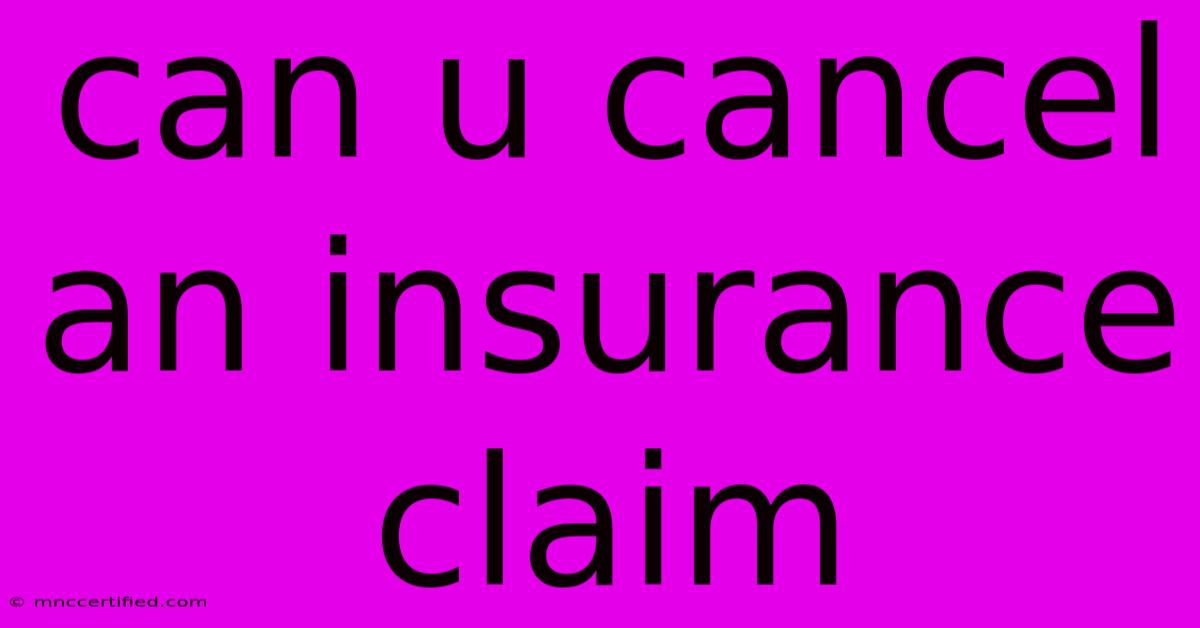Can U Cancel An Insurance Claim

Table of Contents
Can You Cancel an Insurance Claim? A Comprehensive Guide
Thinking about canceling an insurance claim? It's a decision that requires careful consideration, as the implications can vary significantly depending on your specific circumstances and the type of insurance involved. This comprehensive guide will explore the possibilities, limitations, and consequences of withdrawing an insurance claim.
When Can You Cancel an Insurance Claim?
The ability to cancel an insurance claim depends heavily on the stage of the claims process, the type of insurance, and your insurance provider's specific policies. Generally, you have a better chance of withdrawing a claim before the insurance company has started an investigation or made a payout.
Before Investigation Begins:
In many cases, you can withdraw a claim before the insurance company has launched a full investigation. This is often the easiest time to cancel. Simply contact your insurer, explain your reasons, and request to withdraw the claim. They will likely require written confirmation. This option is generally available for:
- Minor incidents: Perhaps you decided the damage wasn't significant enough to warrant a claim after all.
- Misunderstandings: You may have filed a claim in error due to a misunderstanding of your policy coverage.
- Changed circumstances: Your situation might have changed, making the claim unnecessary.
After Investigation Begins:
Once the insurance company has started its investigation, canceling becomes significantly more challenging. They may have already incurred expenses, contacted witnesses, or begun repairs. Withdrawing at this stage might be impossible or come with penalties, depending on your policy and the insurer's discretion. They might:
- Deny the cancellation request: They may refuse to cancel, especially if they've invested resources into the investigation.
- Charge fees: Some insurers may charge fees for processing the claim, even if it's withdrawn.
- Impact future claims: Canceling a claim, especially if it's deemed suspicious, could affect your ability to file future claims. This is a crucial point to consider.
Specific Insurance Types:
The rules regarding claim cancellation also vary depending on the type of insurance:
- Auto Insurance: Canceling an auto insurance claim is generally more difficult once the investigation has begun, particularly if damage has already been assessed or repairs started.
- Homeowners Insurance: Similar to auto insurance, canceling after an investigation begins is usually difficult. This is especially true if the damage is extensive or requires significant repairs.
- Health Insurance: Health insurance claim cancellations are less common and usually depend on the specifics of the medical billing and the provider's policies. Misunderstandings about billing are more likely to lead to corrections than complete cancellations.
- Life Insurance: Life insurance claims are generally not cancellable after being filed, as they're related to a death claim.
Reasons for Canceling an Insurance Claim
Several reasons might lead you to consider canceling a claim:
- Minor Damage: The cost of repairs might be less than your deductible.
- Relationship with Insurer: Maintaining a good relationship with your insurer is key, and cancelling a claim might protect your record.
- Avoid Premium Increases: While unlikely in most cases, some insurers may increase premiums if they see a pattern of frequent claims.
- Avoid the Hassle: The claims process can be time-consuming and stressful.
Consequences of Canceling an Insurance Claim
Before canceling, carefully consider the potential consequences:
- Financial Loss: You'll be responsible for covering all costs associated with the damage or incident.
- Impact on Future Claims: As mentioned, a canceled claim might be flagged and affect your ability to file future legitimate claims.
- Potential Penalties: Depending on your insurer and the circumstances, you could face penalties for withdrawing.
Before You Cancel: Consult with Your Insurer
Always contact your insurance company before attempting to cancel a claim. Discuss your reasons for wanting to withdraw and inquire about any potential consequences. Getting their official guidance is crucial to avoid unexpected repercussions.
By understanding the nuances of canceling an insurance claim, you can make an informed decision that protects your financial well-being and your relationship with your insurance provider. Remember, this information is for general guidance only, and specific policies and procedures vary by insurer. Always refer to your policy documents or contact your insurance company for the most accurate information.

Thank you for visiting our website wich cover about Can U Cancel An Insurance Claim. We hope the information provided has been useful to you. Feel free to contact us if you have any questions or need further assistance. See you next time and dont miss to bookmark.
Featured Posts
-
Motor Club Of America Insurance
Nov 23, 2024
-
Chers Mask Film Criticism Bogdanovich
Nov 23, 2024
-
Bir Gecede En Cok Yuekselen Coin
Nov 23, 2024
-
Dione Protocol Price Prediction
Nov 23, 2024
-
Covenant University Tuition Fee
Nov 23, 2024